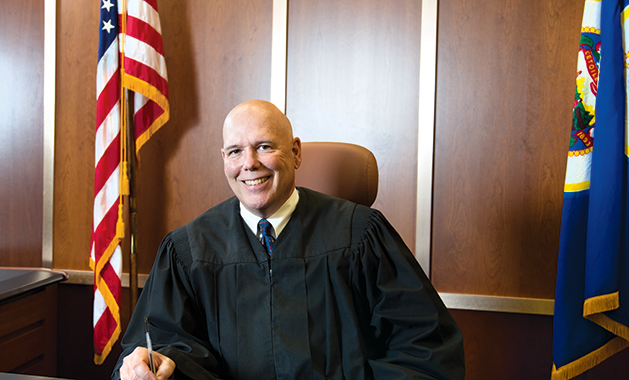
In her first year as president of the Minnesota State Bar Association, Stillwater’s Robin Wolpert has heard frustrations from people in Washington County about how little they hear about the judicial system in the news. “Too many people get their idea of what goes on in court from daytime television, or even nighttime TV,” says district court judge and assistant chief judge Susan Miles of the Washington County Courthouse.
So, this month, St. Croix Valley Magazine will team up with Wolpert and local judges to answer court-related questions—simple or complex—submitted via our Facebook page or email.
What to Expect at a Hearing
It’s around 8 a.m. on a Monday, a few minutes before he dons his black gown, and Judge John C. Hoffman sits in his office in Stillwater’s Washington County Court, looking over the morning’s implied consent hearings. Persons who have allegedly driven under the influence have petitioned their license revocation.
Implied consent is a civil rather than criminal case. In a criminal case, the burden of proof rests on the state. The state must prove that you drove under the influence, for example. With implied consent, on the other hand, a petitioner must prove that something went wrong when the officer pulled them over to test for controlled substances.
Maybe the officer didn’t have probable cause, or didn’t explain that refusing to test constitutes a separate crime, or that the driver could contact his or her lawyer.
To mount an argument, petitioners in the past few years found wiggle room in an aspect of testing that pushes constitutionality. Say an asthmatic person refuses to take a breath test. Extracting blood requires a search warrant. In flux is whether taking urine counts, too. (Can an officer coerce someone into urinating?) This issue quickly gets into fundamental rights. But what petitioners often don’t realize, Hoffman says, is that driving itself is merely a state-granted privilege.
Trying to prove you couldn’t breathe or urinate challenges a judge’s patience, and behavior in court does matter.
For judges, this means “judicial demeanor”: showing “an awareness of the pool of humanity that’s out in front of you,” Miles says—in all of its pain.
Prison Time
Washington County has two prisons in its backyard, after all. Miles can’t ignore the impact of incarceration. “My worst days are sending people to prison for probation violations,” she says. Last year, she and Hoffman joined a Washington County steering committee that piloted a new dosage probation program, where certain offenders exchange probation time for rigorous programming, as for chemical dependence.
“It recognizes the humanity of an individual and that they are capable of changing,” Miles says. At the end of the day, she hopes that “a defendant, after being in court, can at least say, ‘Yeah, I didn’t agree with the consequences she imposed on me, but she at least listened, and she treated me fair,’” she says. “That’s what everybody should expect.”
Ask anything about the court process on our Facebook page @facebook.com/scvmag. We’ll get the questions to our judges and answers post-haste throughout the month of August.









